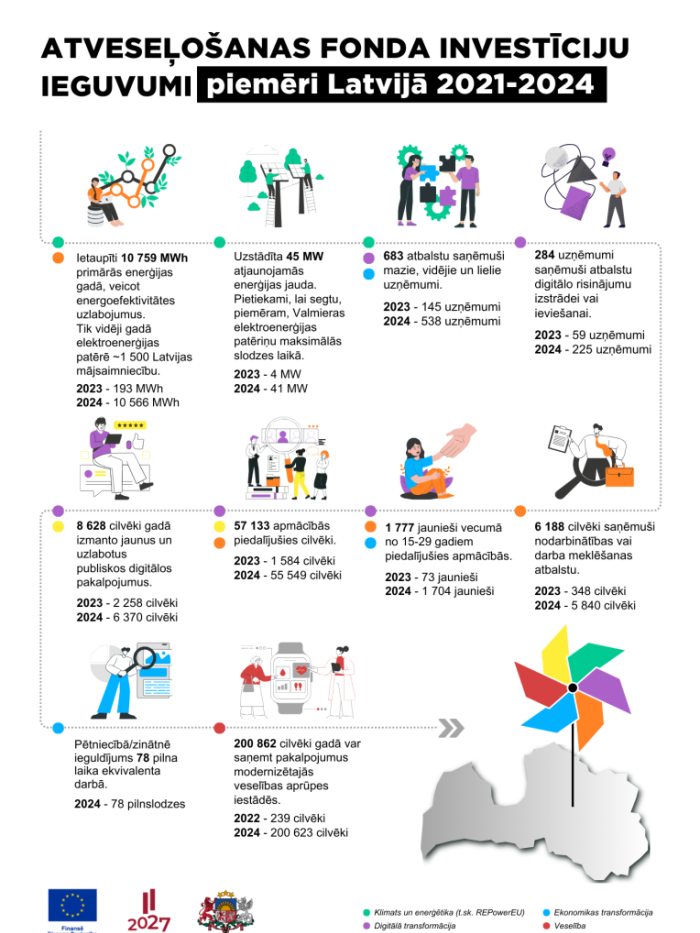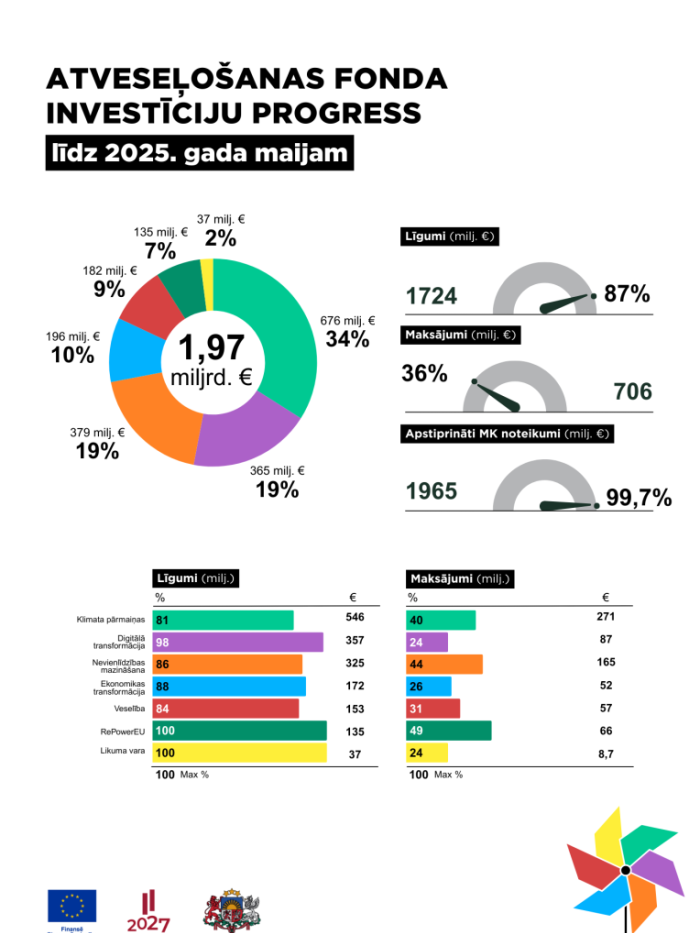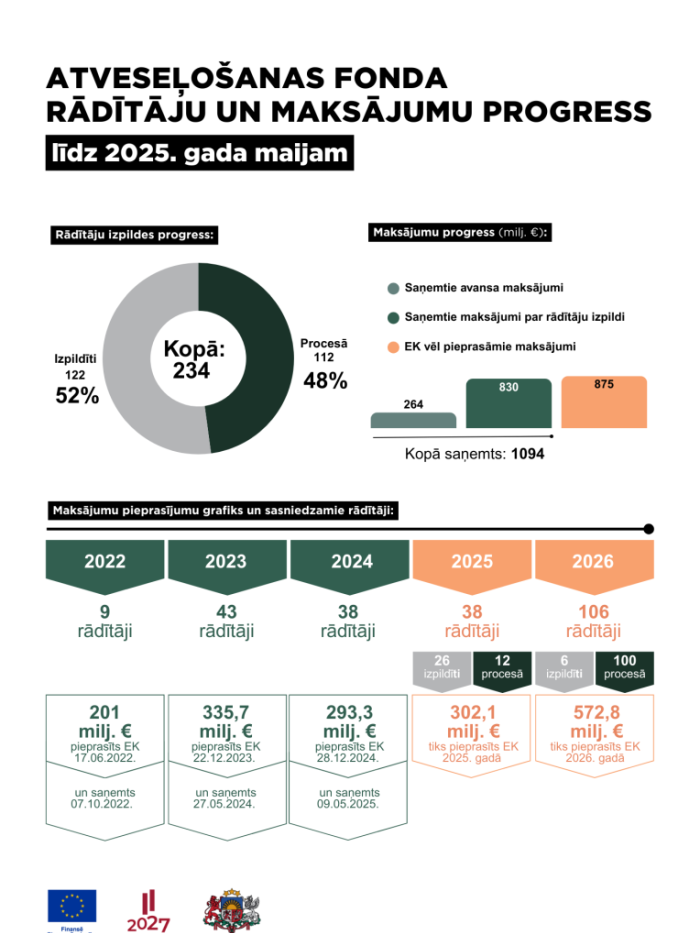On Friday, 9 May, the House of Science at the University of Latvia (UL) hosted an event marking the receipt of Latvia’s third payment under the Recovery and Resilience Facility (RRF), amounting to €293 million. This payment is part of the total €1.97 billion allocated to Latvia under the RRF. The funds were disbursed following the European Commission’s (EC) positive assessment and approval of 38 reform and investment milestones completed by Latvia, submitted for evaluation at the end of 2024. With this third payment, Latvia has now received over €1 billion — approximately 55% of the total available funding.
During the event, European Commissioner for Economy, Productivity, Implementation and Simplification, Valdis Dombrovskis, presented the official confirmation of the €293 million disbursement to Minister of Finance Arvils Ašeradens. The event was also attended by Minister for Education and Science, Dace Melbārde, as well as the rectors of the University of Latvia and Riga Technical University.
Opening the forum, Commissioner Dombrovskis stated:
“The European Commission recognises that Latvia has implemented a broad set of reforms and investments, enabling it to receive €293 million today. Projects such as the development of industrial parks, provision of laptops to students, construction of affordable housing in the regions, and the promotion of scientific excellence are all examples that demonstrate Latvia’s successful use of the RRF. With this payment, Latvia has now received more than half of its allocation. However, all milestones and targets must be achieved by the end of August 2026 – therefore, we urge Latvia to accelerate the implementation of the remaining reforms and investments.”
Accepting the confirmation of the payment, Minister Ašeradens noted:
“The third payment confirms that Latvia is delivering on its ambitious reform and investment plan under the RRF. Significant progress has been made. These funds will support continued implementation of projects – including the construction of disaster and emergency response centres, energy efficiency improvements in apartment buildings, businesses and public buildings, digitalisation in both the private and public sectors, and the development of a competitive passenger rail network, among others. The RRF’s clear timeline calls for determined and timely action from all responsible institutions.”
Minister Melbārde highlighted the impact of the RRF in the fields of education and science:
“Providing laptops to students and creating new, extensive opportunities for study and research in the fast-changing field of digital solutions is already laying a strong foundation for Latvia’s digital transformation. These initiatives help ensure access to education that matches the demands of today’s labour market, supports well-paid employment, and promotes innovation and entrepreneurship. We can be proud that investments are not only enabling new technologies but also strengthening collaboration between universities to develop internationally competitive areas of expertise in high-level digital solutions.”
In the first stage of the RRF, Latvia achieved 9 milestones and received €201 million; in the second stage, 43 milestones and €336 million. In this third stage, the completion of 38 milestones has delivered tangible results in all six reform areas:
- Climate and energy: Latvia adopted new regulations to promote sustainable energy, enabling the upgrade of 150 km of power lines, the addition of 70 MW to the electricity grid, the development of Latvia’s first regional biomethane injection point in Džūkste, and the construction of one of the most powerful battery energy storage systems in Rezekne (60 MW). Electrified rail lines such as Rīga–Zemitāni and Rīga–Sloka are being modernised, and the Zasulauks–Bolderāja line is being developed to promote green mobility and reduce emissions, while improving the speed and convenience of public transport.
- Digital transformation: Nearly 36,000 laptops have been delivered to schools and municipalities to support general education. New regulations have been developed to encourage companies to invest in employee training. ICT solutions have been implemented to modernise public administration.
- Reducing inequality: Regulations have been adopted to improve the minimum income support system. Municipal contracts for long-term care services for the elderly have been concluded. Projects have been approved to develop industrial parks and build 300 affordable housing units in the regions.
- Education and innovation: Consolidation plans of seven higher education institutions have been approved to strengthen competitiveness. Human resource capacity in innovation management has been enhanced.
- Health: A comprehensive study on the availability and quality of secondary outpatient care has been completed. A full mapping of healthcare human resources has been conducted to inform planning for specialist availability.
- Rule of law: A national assessment of the shadow economy has been published and a guide to managing undeclared wage risks has been developed. Design and construction contracts have been concluded for new customs control infrastructure at Kundziņsala port. To promote integrity and transparency in public administration, the State Administration School has introduced a competency framework and training programmes in ethics, anti-corruption, fraud prevention, and conflict of interest management, as well as professional development in public procurement, customer service, leadership, legal practice, and policy implementation.
Currently, implementation of RRF-funded investments is in full swing. Responsible institutions are preparing the next set of milestones to be submitted to the EC in 2025 for Latvia’s fourth payment request, worth €302 million.
Project selection procedures have been completed or are underway across all RRF investment areas, covering a total of €1.96 billion (99.7% of the RRF allocation). Projects worth €1.7 billion (87%) are in active implementation. The largest contracts involve improvements to national and regional road networks, energy efficiency measures for businesses, and railway electrification. To date, €706 million in payments have been made to project implementers. Payment intensity is expected to rise significantly in 2025 and 2026 as the final deadline approaches.
Priority over the coming period will be on completing major infrastructure projects, including the modernisation and greening of public transport in Rīga and its metropolitan area, development of cycling infrastructure, and construction of the southern section of Rīga Central Railway Station. Work is also underway on nearly zero-energy disaster and emergency response centres and flood prevention infrastructure to strengthen national resilience. Major investments are being made in the health sector, with upgrades to infrastructure and equipment in 10 hospitals across Rīga and the regions, as well as several outpatient facilities.
Under EU rules, Member States must submit payment requests to the European Commission according to set timelines and only once relevant reform and investment milestones have been achieved. To receive the full €1.97 billion under the RRF, Latvia must meet 234 milestones and targets by the end of August 2026.
The House of Science at the University of Latvia was chosen as the venue for this event due to the strategic significance of the digitalisation projects being implemented there in cooperation with Riga Technical University and other partners. A total of €17 million in RRF funding has been allocated to three flagship initiatives: the Quantum Technologies Initiative, the Language Technologies Initiative, and a project to develop high-performance computing skills. As highlighted during the event by Professor Andris Ambainis, Head of the Quantum Computing Centre at the Faculty of Computing, the development of quantum technologies in Latvia could enable solutions to complex, internationally relevant problems with limited human resources and strengthen Latvia’s position in the European digital and research space. Latvia has the potential to develop niche but strategically important competencies and collaborate with leading research institutions worldwide.






